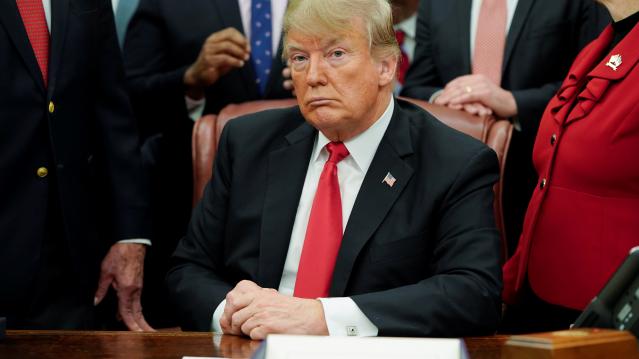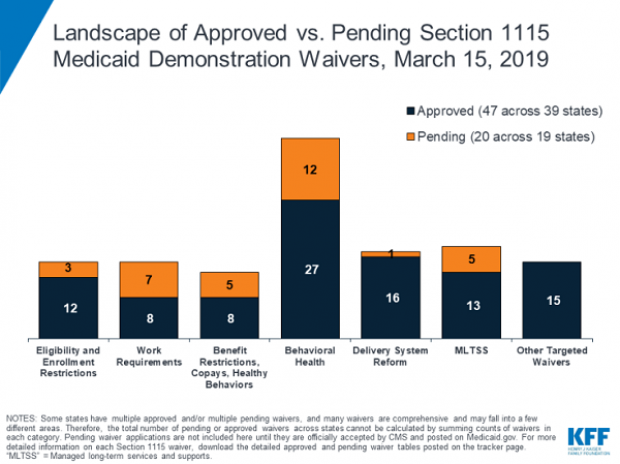Republicans Push Ahead on Medicaid Restrictions

The Trump administration on Friday approved Ohio’s request to impose work requirements on Medicaid recipients. Starting in 2021, the state will require most able-bodied adults aged 19 to 49 to either work, go to school, be in job training or volunteer for 80 hours a month in order to receive Medicaid benefits. Those who fail to meet the requirements over 60 days will be removed from the system, although they can reapply immediately.
The new work requirements include exemptions for pregnant women, caretakers and those living in counties with high unemployment rates and will apply only to those covered through the expansion of Medicaid under the Affordable Care Act. There are currently about 540,000 people on Medicaid in Ohio who receive coverage through the expansion, according to Kaitlin Schroeder of The Dayton Daily News, compared to roughly 2.6 million Medicaid recipients in the state overall.
Once implemented, the work requirements are expected to result in 36,000 people losing their Medicaid eligibility, according to state officials, though critics say the reductions could be significantly larger. Similar work requirements in Arkansas pushed 18,000 people off the Medicaid rolls in six months.
A larger GOP project: The creation of new work requirements is part of a larger effort by Republicans to limit the expansion of Medicaid, says The Wall Street Journal’s Stephanie Armour. Since the Affordable Care Act passed in 2010, 36 states have expanded their Medicaid programs under the ACA and the number of people in the program has grown by 50 percent, from roughly 50 million to about 75 million. But many red-state governors have expressed concerns about the cost of Medicaid expansion and worries about a lack of self-sufficiency among the able-bodied poor, and are embracing new limitations on the program for both fiscal and political reasons.
In 2017, the White House in 2017 gave states the green light to explore ways to limit the reach and expense of their Medicaid programs. Governors have proposed a variety of new rules, which require waivers from the federal government to enact. Kentucky, for example, wants to drug-test Medicaid recipients, and Utah wants a partial expansion and a cap on payments. Kaiser Health News summarizes the variety of waivers states have requested, which are governed by Section 1115 of the Social Security Act, in the chart below.
Legal challenges: Efforts to restrict Medicaid have received legal challenges, and U.S. District Judge James Boasberg blocked work requirements in Kentucky last year. The same judge, who has expressed doubts about the administration’s approach to Medicaid, will rule on the legality of work requirements in both Kentucky and Arkansas by April 1.
The bottom line: The Trump administration is seeking fundamental changes in how Medicaid works. Even if Boasberg rules against work requirements, expect the White House and Republican governors to continue to push for new limitations on the program.
Some States Will See Dramatic Obamacare Price Hikes in 2018

Premiums for Affordable Care Act policies are set to rocket higher in many places in 2018. Many of the rates for next year won't be made public until November, but The New York Times found that Georgia has already approved increases of up to 57.5 percent, while the average rate in Florida will jump by about 45 percent and the average in New Mexico will climb by 30 percent. Minnesota, on the other hand, announced this week that a new state reinsurance program has helped stabilize rates and price changes for individual plans in the state will range from a decrease of 38 percent to an increase of 3 percent.
Confusion stemming from the White House and Congress, including uncertainty about whether the Trump administration will continue to make cost-sharing payments to insurers, is largely driving the increases. Keep in mind, though, that about 85 percent of people who buy insurance through Obamacare exchanges won’t feel the price hikes because their plans are subsidized — but the federal government will have to shell out more for those subsidies.
A Tax Reform 'Game Changer'?
The National Association of Home Builders says it's open to changes to the mortgage-interest deduction — a major policy shift that could have significant implications for the Trump administration's proposed tax reform, Politico's Lorraine Woellert reports. The break benefiting homebuyers was preserved as part of the tax framework released last week, but the reform plan also calls for increasing the standard deduction, a shift that would make the mortgage interest deduction less valuable. The National Association of Realtors last week criticized the administration's plan, even though it left the mortgage tax break in place. "This proposal recommends a backdoor elimination of the mortgage interest deduction for all but the top 5 percent who would still itemize their deductions," the group's president said.
Warren Buffett: Eliminating the Estate Tax Would Be a ‘Terrible Mistake’

The world’s second-wealthiest man is worth about $75 billion, but he isn’t worried about the government taking a bite out of his estate after he’s gone. In fact, Buffett thinks the estate tax, which applies to just a few thousand estates a year, is a reasonable way to allocate resources, especially in a society in which the rich have gotten much richer over the last few decades. Buffett’s main concern is the emergence of “dynastic wealth” that “goes totally against what built this country, what this country stands for.” In an interview Tuesday, Buffett criticized the latest GOP proposal to get rid of the estate tax: "If they pass the bill they're talking about, I could leave $75 billion to a bunch of children and grandchildren and great-grandchildren. And if I left it to 35 of them, they'd each have a couple billion dollars ... Is that a great way to allocate resources in the United States?” (CNBC)
Treasury Pulls a Paper That Contradicts Mnuchin’s Corporate Tax Argument
The Treasury Department has taken down from its website a 2012 analysis that found that business owners and shareholders — not workers — bear most of the burden of corporate taxes. The findings of the report run counter to the argument Treasury Secretary Steven Mnuchin has been making in selling the benefits of a reduction in the corporate tax rate. The Trump administration’s tax reform framework calls for dropping the corporate rate from 35 percent to 20 percent.
The 2012 report from the Office of Tax Analysis found that “workers pay 18 percent of the corporate tax while owners of capital pay 82 percent” — figures that are “in line with many economists’ views and close to estimates from the nonpartisan Joint Committee on Taxation and Congressional Budget Office,” according to The Wall Street Journal.
A Treasury spokeswoman told the Journal: “The paper was a dated staff analysis from the previous administration. It does not represent our current thinking and analysis.”
Jason Furman, who was chairman of President Obama’s Council of Economic Advisors, tweeted that the goal of the technical paper series that included the removed study “was to be more transparent about the methodology Treasury used for its modeling and analysis.”
Treasury website has 40+ yrs of Tax Working & Technical Papers. This is the only one removed https://t.co/QzLTSHderk https://t.co/MFZRd7HoFQ
— Jason Furman (@jasonfurman) September 29, 2017
Trump’s Cabinet Would Benefit from Tax Plan Too
“Eliminating the estate tax would save the Trump Cabinet over a billion dollars," Oliver Willis writes. "Like Mnuchin, Trump’s secretaries would make out like bandits. Commerce Secretary Wilbur Ross would get an extra $545 million. The family of Education Secretary Betsy DeVos would rake in $900 million. Linda McMahon, head of the Small Business Administration, and her husband, WWE founder Vince McMahon, would take in $250 million. Trump’s own net worth is in dispute, thanks to his failure to reveal his tax returns, but based on his estimated net worth of $3 billion, the estate tax scheme would net him $564 million.” (Shareblue Media, Bloomberg)

